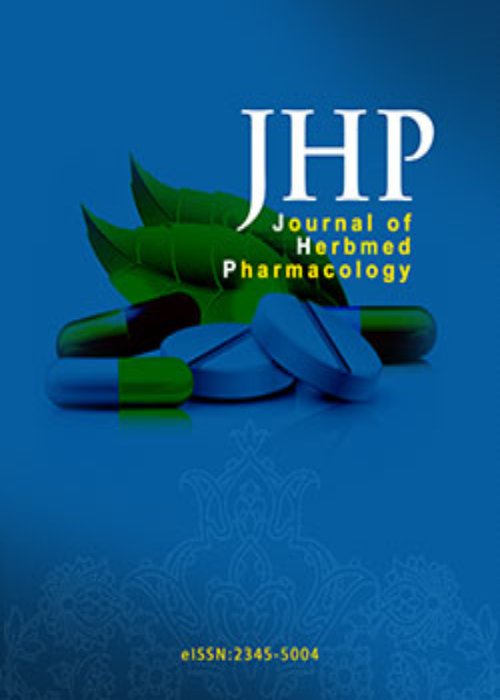Methanol fraction of Calliandra portoricensis root bark activates caspases via alteration in mitochondrial viability in vivo
Article Type:
Research/Original Article (دارای رتبه معتبر)
Abstract:
Introduction
Dysregulated apoptosis is associated with a number of disease conditions. Traditionally, Calliandra portoricensis is used in the management of prostate enlargement. This study investigates the in vivo effect of potent methanol fraction of C. portoricensis (MFCP) on mitochondrial permeability transition (mPT) pore, an important pharmacological target in treatment of various diseases, and examines the toxicities associated with its oral administration.
Methods
Forty-two male Wistar strain rats (70-80 g) were divided into 6 groups of 7 animals each. Each group was orally administered 25, 50, 100, 200, 400 mg/kg MFCP and the control group received distilled water for 21 and 30 days, respectively. mPT, assay for serum enzymes and hematological parameters were assessed spectrophotometrically while activation of caspases 3 and 9 was done by ELISA technique. Histological assessment of vital organs (liver, kidney, prostate) was carried out according to standard procedures.
Results
There were no significant effects on mPT pore at all doses administered after 21 days of oral administration. However, after 30 days of administration, MFCP induced mPT pore opening at doses 100 and 200 mg/kg with induction folds of 2.6 and 3.3, respectively while there was no induction of mPT pore opening at lower doses of 25 mg/kg and 50 mg/kg. Furthermore, significant (P < 0.05) increases in serum enzymes (ALT, AST) were observed at all doses administered when compared with control after 30 days of oral administration. Cell counts (Hb, PCV, RBC, WBC) were adversely affected at the highest dose (200 mg/kg) compared with control and other treated groups (25, 50 and 100 mg/kg) after 30 days of administration. Similarly, activation of caspases 9 and 3 were observed in rat liver homogenate at high doses of the fraction while histological evaluation showed degeneration and distortion of organs at the highest dose.
Conclusion
MFCP contains phytochemicals that elicit the opening of the pore and induction of mitochondrial-mediated apoptosis. This would be relevant in treatment of degenerative diseases that results from down-regulation of apoptosis. However, caution should be exercised in using high doses of the plant.Keywords:
Language:
English
Published:
Journal of Herbmed Pharmacology, Volume:7 Issue: 4, Oct 2018
Pages:
251 to 258
magiran.com/p1893153
دانلود و مطالعه متن این مقاله با یکی از روشهای زیر امکان پذیر است:
اشتراک شخصی
با عضویت و پرداخت آنلاین حق اشتراک یکساله به مبلغ 1,390,000ريال میتوانید 70 عنوان مطلب دانلود کنید!
اشتراک سازمانی
به کتابخانه دانشگاه یا محل کار خود پیشنهاد کنید تا اشتراک سازمانی این پایگاه را برای دسترسی نامحدود همه کاربران به متن مطالب تهیه نمایند!
توجه!
- حق عضویت دریافتی صرف حمایت از نشریات عضو و نگهداری، تکمیل و توسعه مگیران میشود.
- پرداخت حق اشتراک و دانلود مقالات اجازه بازنشر آن در سایر رسانههای چاپی و دیجیتال را به کاربر نمیدهد.
دسترسی سراسری کاربران دانشگاه پیام نور!
اعضای هیئت علمی و دانشجویان دانشگاه پیام نور در سراسر کشور، در صورت ثبت نام با ایمیل دانشگاهی، تا پایان فروردین ماه 1403 به مقالات سایت دسترسی خواهند داشت!
In order to view content subscription is required
Personal subscription
Subscribe magiran.com for 70 € euros via PayPal and download 70 articles during a year.
Organization subscription
Please contact us to subscribe your university or library for unlimited access!


